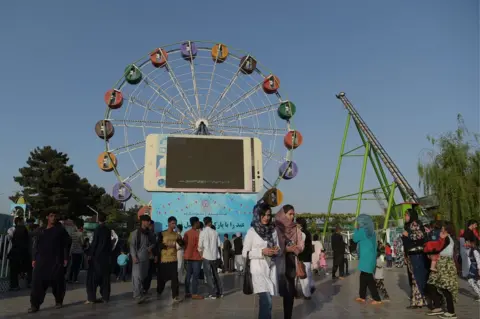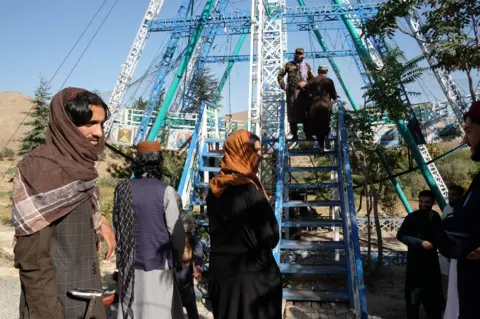Afghanistan: Taliban ban women from Kabul parks
 AFP
AFPThe Taliban have banned women from visiting all parks in Kabul, excluding them still further from public life in Afghanistan.
A spokesman for the Vice and Virtue Ministry told the BBC those managing parks in the capital had been told not to allow women in.
The group claims Islamic laws were not being followed at parks.
Women's rights and freedoms have been severely restricted since the militant Islamists seized power in August 2021.
Under Taliban rules on segregating people by gender, women have been allowed to visit parks on three days every week - Sunday, Monday, Tuesday - and men on the remaining four.
Now women won't be allowed even if accompanied by male relatives.
"We've done this because in the past 15 months, despite our efforts, people have been going to the park and not respecting Sharia laws," Mohammed Akif, spokesman for the Ministry of Propagation of Virtue and Prevention of Vice, told the BBC.
"The restriction is for all women, whether they are with or without a mahram [male escort]."
 Getty Images
Getty ImagesThe ban on women extends to amusement parks that usually have rides like bumper cars or a ferris wheel, and where families visit together with their children.
It appears to be in force only in the capital for now, but in the past such rules have eventually applied across the country.
One woman who Reuters news agency caught up with at the entrance to a Kabul park was disappointed after being turned away.
"When a mother comes with their children, they must be allowed to enter the park, because these children haven't seen anything good... they must play and be entertained," said Masooma, who gave only her first name for security reasons.
Under the Taliban women in Afghanistan have been subjected to a series of curbs on their freedoms.
A number of women have been beaten for demanding their rights.
Women are barred from going on longer distance journeys without a male chaperone. Teenage girls have still not returned to school in most of the country, despite Taliban promises to allow them to do so.
While some women still work in sectors such as healthcare and education, most were told not to go to work after the Taliban swept back to power. In May a decree was passed ordering women to wear the Islamic face veil in public, although some in urban areas can still be seen failing to comply.
The Taliban have vowed there will be no brutal repression of women as there was when they were first in power in the 1990s.
They say they now respect women's rights in line with Sharia law, and are not against women being educated or having jobs.
But Western diplomats have indicated to the Taliban that resuming development funding for a country in deep economic crisis depends on the treatment of women improving.
